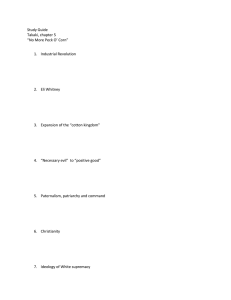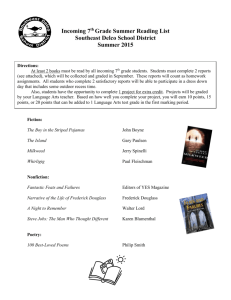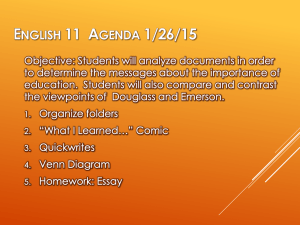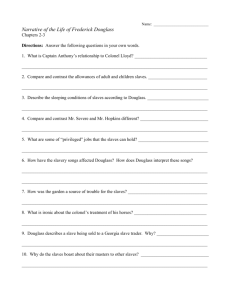History 1301-winter.doc
advertisement
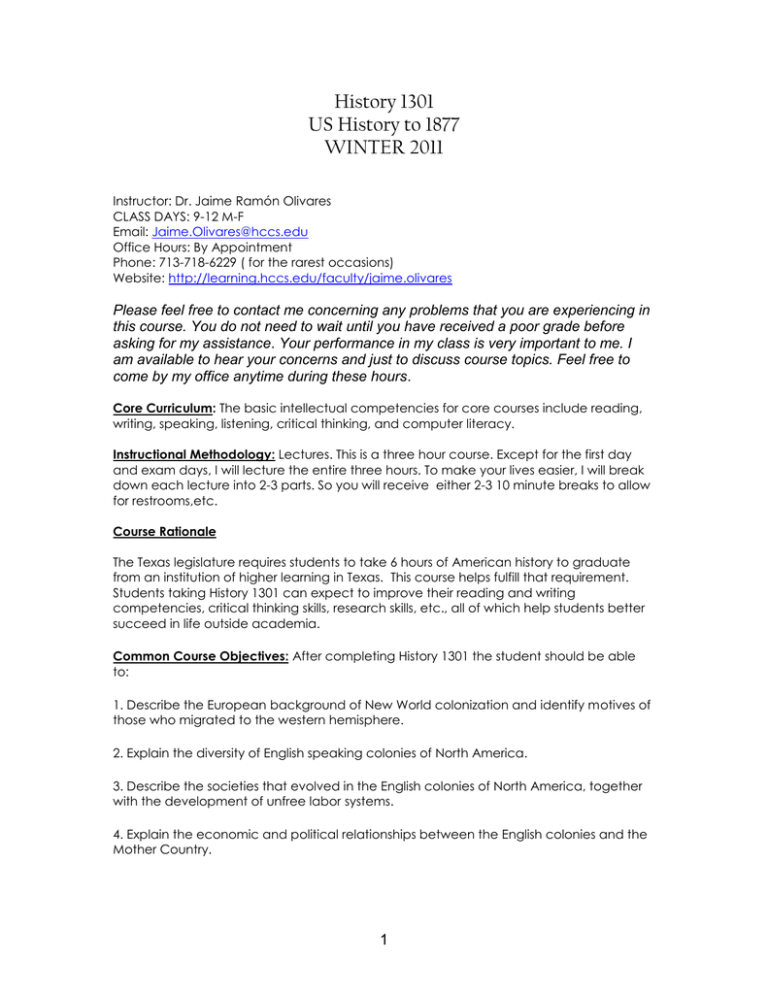
History 1301 US History to 1877 WINTER 2011 Instructor: Dr. Jaime Ramón Olivares CLASS DAYS: 9-12 M-F Email: Jaime.Olivares@hccs.edu Office Hours: By Appointment Phone: 713-718-6229 ( for the rarest occasions) Website: http://learning.hccs.edu/faculty/jaime.olivares Please feel free to contact me concerning any problems that you are experiencing in this course. You do not need to wait until you have received a poor grade before asking for my assistance. Your performance in my class is very important to me. I am available to hear your concerns and just to discuss course topics. Feel free to come by my office anytime during these hours. Core Curriculum: The basic intellectual competencies for core courses include reading, writing, speaking, listening, critical thinking, and computer literacy. Instructional Methodology: Lectures. This is a three hour course. Except for the first day and exam days, I will lecture the entire three hours. To make your lives easier, I will break down each lecture into 2-3 parts. So you will receive either 2-3 10 minute breaks to allow for restrooms,etc. Course Rationale The Texas legislature requires students to take 6 hours of American history to graduate from an institution of higher learning in Texas. This course helps fulfill that requirement. Students taking History 1301 can expect to improve their reading and writing competencies, critical thinking skills, research skills, etc., all of which help students better succeed in life outside academia. Common Course Objectives: After completing History 1301 the student should be able to: 1. Describe the European background of New World colonization and identify motives of those who migrated to the western hemisphere. 2. Explain the diversity of English speaking colonies of North America. 3. Describe the societies that evolved in the English colonies of North America, together with the development of unfree labor systems. 4. Explain the economic and political relationships between the English colonies and the Mother Country. 1 5. Describe the economic, religious and political developments in eighteenth century Colonial America. 6. Identify the wars fought by English colonists in North America and evaluate the impact of those wars, particularly the French and Indian War. 7. Trace the growing alienation of the colonies from Great Britain, which ended with the decision to declare independence. 8. Describe the course of the American Revolution to the winning of Independence, including the significant campaigns and the diplomatic maneuvers that helped gain victory. 9. Explain the impact of the American Revolution on American society and politics and the problems that arose after independence. 10. Describe the restructuring of the Republic at the Constitutional Convention of 1787 and the fight for the ratification of the Constitution. 11. Trace the rise and development of political parties during the 1790s, including the contributing domestic and foreign policy differences and the attempted suppression of the Republicans by the High Federalists. 12. Describe the key events and developments of the Jefferson and Madison administrations, including the attempts to avoid war with Britain, together with the outcomes of the War of 1812. 13. Describe the territorial expansion and economic developments after the War of 1812. 14. Trace the social, economic and political developments of the Jacksonian Era which democratized the United States and transformed the party system. 15. Identify the religious developments and reform movements of the Antebellum Era. 16. Describe the territorial and internal expansion of the United States during the 1830s and 1840s, including the war with Mexico. 17. Trace the expansion of slavery in the early nineteenth century and explain the effects of that expansion. 18. Describe the African American experience under slavery. 19. Explain the events from the Compromise of 1850 to the election of 1860 that led to the disruption of the union. 20. Trace the course of the Civil War from secession to Appomattox, paying particular attention to the social, economic and political effects of the conflict. 21. Describe the reconstruction of the South and explain its failure. 2 22. Identify the major problems of the Grant administration and evaluate his handling of those problems Textbooks (Required) Foner, Give Me Liberty Volume 1 (or you may also consult www.digitalhistory.uh.edu, as a reference guide) Thomas Paine, Common Sense (or, http://www.ushistory.org/paine/commonsense/) Narrative of the Life of Frederick Douglass (or http://www.gutenberg.org/files/23/23-h/23-h.htm) Course Requirements: 1) 3 In class examinations (300 Points) a) Each exam will consist of 50 multiple choice questions from lectures and textbook. b) Exams must be taken at scheduled date and time. c) You must begin the exam at the latest by 15 minutes after test has started. If you arrive late, you will not take the exam AND YOU WILL RECEIVE A ZERO ON THAT EXAM. 1)In other words, you have until 9:15 am to begin the exam. MY TIME!! d) You may not leave once exam has started.If you leave, you are done with your exam. e) During exams, cell phones must be turned on silent/vibrate and MAY NOT BE ANSWERED. If you answer the phone during test, I will give you zero. NO EXCEPTIONS. f) I DO NOT OFFER MAKEUP EXAMS. IF YOU MISS AN EXAM, IT IS A ZERO. . 2) Thomas Paine Questions (100 Points) a) Each student will answer questions dealing with Common Sense b) Papers must be turned in on time. C)No late work accepted. “LATE” is defined as beginning of the class. d) I do not accept email submissions UNDER ANY CIRCUMSTANCES. e) DUE DATE: December 23,2011 by 9 am ( I will not accept late work I have started lecture) 3) Narrative Assignment (100 POINTS—EACH QUESTION WILL BE WORTH 3 POINTS) a) You will answer the questions as posed on the website. b) Assignments must be typed. c) All assignments must be double spaced d) Assignment is due at the beginning of class on the date of the assignment. e) There are further instructions on the web assignment. F) DUE DATE: January 4, 2012 by 9am( I will not accept late work once I have started lecture) F) NO LATE WORK ACCEPTED. 3 TOTAL AMOUNT OF POSSIBLE POINTS IS 500 ADD YOUR GRADES AND SEE THE CHART BELOW. GRADE METHODOLOGY A=448-500 B=398-447 C=348-397 D=298-347 F=0-297 CLASSROOM POLICIES Classroom rules: 1) PLEASE PUT CELLPHONES ON SILENT OR VIBRATE. FIRST TIME THAT YOUR PHONE RINGS DURING LECTURE IS A WARNING. SECOND VIOLATION WILL LEAD TO A CONFISCATION OF SAID ITEMS. 2) DO NOT TEXT OR RECEIVE TEXTS DURING LECTURE. IF YOU DO SO, I WILL ASK YOU TO LEAVE THE ROOM 3) EATING—YOU MAY EAT FOOD AND DRINK LIQUIDS. DO NOT MAKE A SPECTACLE IN CLASS. GENERAL RULE—IF I CAN HEAR YOU, YOU ARE TOO LOUD. 4) I DO NOT MIND IF YOU NEED TO ASK A FELLOW STUDENT A QUESTION, BUT A RUNNING CONVERSATION WILL NOT BE TOLERATED. 5) IF YOU MUST LEAVE EARLY, TRY TO SIT CLOSE TO THE DOOR SO YOU WILL NOT BE A DISTRACTION. 6) I DO NOT MIND IF YOU RECORD THE LECTURES. 7) LAPTOPS,IPADS,KINDLES, NOOKS,ETC.THAT ARE BEING USED FOR LECTURE RECORDING ARE ACCEPTABLE. IF I SEE YOU ON FACEBOOK,TWITTER,ETC. YOU WILL BE ASKED TO TURN OFF ITEM AND NOT BE ALLOWED TO BRING IT BACK. Student Privacy: The federal government requires that student privacy be preserved. Thus the posting of grades, even by the last four digits of the social security number, is forbidden. All communication will remain between the instructor and the student, and the instructor will not be able to share details of the student's performance with parents, spouses, etc. I can not give out grades over the phone or by email, but you may check your final grades.With the exceptions recognized in this policy,the release of student records shall require written approval of the eligible student. In all instances legaldirectives and requirements of the Family Educational Rights and Privacy Act of 1974 and the TexasPublic Information Act pertaining to student records shall be followed. How Do I get my grades? Students may access a copy of their grades by logging on to the HCC web site at www.hccs.edu and logging on to your account. You can view grades by clicking "view grades" or "view unofficial transcript" which will allow you to view the most recent semester grades Attendance Policy: 4 You are expected to attend all lecture classes and labs regularly. You are also responsible for materials covered during your absences. Class attendance is checked daily. Although it is your responsibility to drop a course for nonattendance, the instructor has the authority to drop you for excessive absences. You may be dropped from a course after accumulating absences in excess of 12.5 percent of the total hours of instruction (lecture and lab). For example, for a three credit-hour lecture class meeting three hours per week (48 hours of instruction), you can be dropped after six hours of absence. WITHDRAWALS Be certain you understand HCC policies about dropping a course. It is your responsibility to withdraw officially from a class and prevent an “F” from appearing on your transcript. When considering withdrawal from a course, remember that: INCOMPLETES I DO NOT ASSIGN INCOMPLETES UNDER ANY CIRCUMSTANCES THE EXPLANATION OF THE FINAL GRADE “FX” Students who stop attending class and do not withdraw themselves prior to the withdrawal deadline can receive a grade of an “FX”, compared to a student who attends class through its entirety and truly earns a grade of an “F”, due to poor performance. The purpose of “FX” is to assist the financial aid department with students who “only come to class to get their financial aid refund” and never come back after it is received. Please note that HCC will not disperse financial aid funding for students who have never attended class. Students who receive financial aid but fail to attend class will be reported to the Department of Education and may have to pay back their aid. A grade of “FX” is treated exactly the same as a grade of “F” in terms of GPA, probation, suspension, and satisfactory academic progress. Repeaters "NOTICE: Students who take a course for the third time or more will face significant tuition/fee increases at HCC and other Texas public colleges and universities. If you are considering course withdrawal because you are not earning passing grades, confer with your professor/counselor as early as possible about your study habits, reading and writing homework, test-taking skills, attendance, course participation, and opportunities for tutoring or other assistance that might be available." Religious Holidays If you observe a religious holiday and miss class, you must notify your instructor in writing two weeks in advance to arrange to take a test or make up an assignment. A religious holiday is “a holy day observed by a religion whose place of worship is exempt from property taxation under Section 11.20, Tax Code.” Scholastic Dishonesty Students are responsible for conducting themselves with honor and integrity in fulfilling course requirements. Penalties and/or disciplinary proceedings may be initiated by 5 College System officials against a student accused of scholastic dishonesty. “Scholastic dishonesty” includes, but is not limited to, cheating on a test, plagiarism, and collusion. “Cheating” on a test includes: • Copying from another student’s test paper; • Using materials during a test that are not authorized by the person giving the test; • Collaborating with another student during a test without authority; • Knowingly using, buying, selling, stealing,transporting, or soliciting in whole or part the contents of an unadministered test; • Bribing another person to obtain a test that is to be administered. “Plagiarism” means the appropriation of another’s work and the unacknowledged incorporation of that work in one’s own written work offered for credit. “Collusion” means the unauthorized collaboration with another person in preparing written work offered for credit. VIOLATIONS/PUNISHMENTS Possible punishments for academic dishonesty may include a grade of “0” or “F” on the particular assignment, failure in the course, and/or recommendation for probation or dismissal from the College System. A recommendation for suspension or expulsion will be referred to the College Dean of Student Development for disciplinary disposition Students with Disabilities: Any student with a documented disability (e.g. physical, learning, psychiatric, vision, hearing, etc.) who needs to arrange reasonable accommodations must contact the Disability Services Office at the respective college at the beginning of each semester. Classroom Behavior As your instructor and as a student in this class, it is our shared responsibility to develop and maintain a positive learning environment for everyone. Your instructor takes this responsibility very seriously and will inform members of the class if their behavior makes it difficult for him/her to carry out this task. As a fellow learner, you are asked to respect the learning needs of your classmates and assist your instructor achieve this critical goal. Use of Camera and/or Recording Devices As a student active in the learning community of this course, it is your responsibility to be respectful of the learning atmosphere in your classroom. To show respect of your fellow students and instructor, you will turn off your phone and other electronic devices, and will not use these devices in the classroom unless you receive permission from the instructor. Use of recording devices, including camera phones and tape recorders, is prohibited in classrooms, laboratories, faculty offices, and other locations where instruction, tutoring, or testing occurs. Students with disabilities who need to use a recording device as a reasonable accommodation should contact the Office for Students with Disabilities for information regarding reasonable accommodations 6 Schedule: Instructor reserves the right to change the schedule.Please note that I do not post lecture powerpoints and/or lend notes to students AT ALL. Dec 19 Dec 20 Dec 21 Dec 22 Dec 23 Dec 26 Dec 27 Dec 28 Dec 29 Dec 30 Jan 2 Jan3 Jan 4 Jan 5 Jan 6 Introduction Native Americans/European Society European Exploration/English Settlement Administration/ Road to Revolution American Revolution/ Thomas Paine Questions Due EXAM1 Critical Period / Jeffersonian Era Jeffersonian Era / Era of Good Feelings Jacksonian America Reform Era (Last Day for Administrative/ Student Withdrawals- 12:00 Noon) EXAM2 Manifest Destiny/Expansionism Path to War (Narrative Questions Due) Civil War Exam 3 (YOU MUST TAKE THE EXAM ON THIS DATE. NO EXCEPTIONS!) Thomas Paine Questions 1)See syllabus for due date 2)Each question is worth 8 points 3)Type your answers/single spaced 4, There is no set number of lines or words for a correct answer. However, a successful answer will typically be half page single spaced. 1. Why do you think Thomas Paine writes Common Sense anonymously and how does he think his work will be remembered? 2. According to Paine, what is the difference between society and government? 3. According to Paine, why is there a need for regulations and government in general? 4. Why does Paine consider the English monarchy to be ineffective? 5. What is the view of Gideon that Paine uses as an example? 6. What does Paine think that America will gain by separating from England? 7.Describe Thomas Paine's life and background, including where he is originally from and what his reputation was before, during, and after writing Common Sense. Also, discuss Paine's motives in writing his pamphlets and the reasons that he chose to remain anonymous at the time. Finally, use the information in Paine's work to explain why he believed strongly in the American Revolution and how his experiences qualified him to chronicle the events as America declared Independence 8.What is Paine's argument based on? What intellectual movement and why? 9. What is the role, for Paine, of the wars in Europe on American independence? 10. How does Paine argue the opposing point of independence? How does he counter the “reconciliationists”? 11)List the reasons why Paine thinks independence is necessary 12. What did you learn from reading this assignment? What is your opinion of the work? Initial Questions: 1. What is a narrative? 2. Is this a primary or secondary source? How do you know? 3. Who do you think this book was originally written for? Why? 7 Chapter I (1) 1. Where and when (approximately) was Douglass born? 2. Discuss Douglass’ parentage. 3. What happens to Douglass’ mom? Apparently, this practice was common among southern slaveholders. What attitude does Douglass say it gave to slaves? 4. Law decreed that all children born to slave women, no matter the father, were to remain slaves. How does this law benefit slave masters? 5. Who is Douglass’ first master? First overseer? What seems to be the overseer’s job? 6. What is the first “bloody scene” of slavery that Douglass ever sees? What happens? Chapter II (2) 1. What is a sloop (use a dictionary!)? In what business is the sloop involved on Colonel Lloyd’s plantation? 2. List the members and relations of Douglass’ master’s family. 3. What did children on the plantation wear? 4. Where did the children sleep? 5. What was Colonel Lloyd’s plantation called? 6. Why did the slaves sing? What mistake did people in the North frequently make regarding slave songs? 7. What did Douglass first understand due to these songs? Chapter III (3) 1. How did Colonel Lloyd deal with the slaves that took care of his horses? 8 2. How wealthy was Colonel Lloyd? Give two to three examples. 3. When asked about his/her master, what did a slave usually say? Why? Chapter IV (4) 1. Describe Mr. Gore. 2. What was Mr. Gore’s maxim? Why might he have practiced this? 3. Describe the situation between Demby and Mr. Gore. 4. What reason does Mr. Gore give for his treatment of Demby? How does Mr. Gore seem to want slaves to think of him? 5. What happened to people who murdered slaves? Why? Chapter V (5) 1. How did the slave children eat? 2. How does Douglass get to leave Colonel Lloyd’s plantation? Where does he go? How is his new master connected to Captain Anthony? 3. Why was Douglass so excited to leave? Why was it so easy for him to leave his home? 4. What surprised Douglass about Sophia Auld? 5. Why does Douglass describe his “departure from Colonel Lloyd’s plantation as one of the most interesting events” of his life? 6. To whom/what does Douglass credit his eventual freedom? Chapter VI (6) 1. Describe Sophia Auld. How and why does Sophia change? 2. Who begins to teach Douglass to read? 9 3. Mr. Auld tells his wife, “if you teach that nigger how to read, there would be no keeping him. It would forever unfit him to be a slave. He would at once become unmanageable, and of no value to his master. As to himself… it would make him discontented and unhappy.” Do you think there is truth in Mr. Auld’s words? Why or why not? 4. What does Douglass realize after Mr. Auld’s speech? 5. How are city slaves treated as compared to plantation slaves? Why is there a difference? 6. Describe Henrietta and Mary and their situation. Chapter VII (7) 1. How does Douglass continue his education? 2. Why does the “Columbian Orator” and a copy of one of Sheridan’s speeches become so often read, and so important to Douglass? 3. Have you ever heard the phrase “ignorance is bliss?” What does it mean? How is this phrase proven true in this stage of Douglass’ life? 4. What word does Douglass become curious about? What does the word mean? (use a dictionary if necessary!) 5. How does Douglass learn to write? Chapter VIII (8) 1. Why is Douglass required to leave Baltimore? 2. At the valuation, why does Douglass suffer more anxiety than many of his fellow slaves? 3. What happens to Douglass’ grandmother? Why does her treatment make Douglass especially angry? 4. Why is Douglass forced to permanently leave Baltimore? 10 Chapter IX (9) 1. Describe Douglass’ new master. 2. How does religion change Thomas Auld? 3. Why does Douglass frequently let his master’s horse run away? 4. Describe Mr. Covey. Why does Douglass gladly take him as a temporary master? Chapter X (10) (pages 69-102) 1. Why is Douglass first whipped by Mr. Covey? Describe the scene. 2. Why does Mr. Covey buy the slave Caroline? 3. What are the first six months of Douglass’ stay with Mr. Covey like? 4. Douglass talks to the boats on the Chesapeake Bay. What kinds of things does he say to them? Why does he envy the boats? 5. Douglass spends several days avoiding Mr. Covey. What happens? 6. What does Sandy Jenkins give Douglass? Does it work? Is there any logical reason for Mr. Covey to not whip Douglass that day? 7. What happens between Douglass and Covey on Monday morning? 8. After the Monday morning incident, why do you think Covey stops whipping Douglass? 9. Why are the next six months a turning point in Douglass’ life? 10. Why does Mr. Covey not take Douglass to the constable (police)? 11. What do slaves typically do over the Christmas break? Why does Douglass think the white masters encourage these activities? 12. Why does Douglass say “I should regard being the slave of a religious master the greatest calamity that could befall me”? 13. When Douglass lives with Mr. Freeland, what does he do on the Sabbaths? 11 14. Why does Douglass think slaves came to his Sabbath meetings? 15. One myth of slavery is that slaves do not love each other. What does Douglass say to prove this myth false? 16. What does Douglass plan with his fellow slaves? Does it work? Why or why not? What happens? 17. Why does Douglass return to Baltimore? 18. What work does Douglass do while he lives in Baltimore? 19. How has Douglass’ attitude changed since he lived with Mr. Covey? 20. Why can Douglass receive no justice when he is attacked by his fellow workers? 21. What trade does Douglass learn? 22. What about Douglass’ current experiences made him desire even more to be free? Chapter XI (11) (pages 103-117) 1. Why does Douglass refuse to give the details about his escape from slavery? 2. What does Douglass ask Hugh Auld for? Does Hugh agree? What are his conditions? 3. Douglass leaves Baltimore without Master Hugh’s permission. Douglass says, “I told him I hired my time, and while I paid him the price which he asked for it, I did not know that I was bound to ask him when and where I should go. This reply troubled him; and, after reflecting a few moments, he turned to me, and said I should hire my time no longer; that the next thing he should know of, I would be running away.” Why do you think Master Hugh is so troubled by what Douglass tells him? 4. For a while, Douglass stops working all together. Then, for several weeks, he becomes very industrious (hard-working). Why? 5. Why is it so difficult for Douglass to leave Baltimore? 6. How does Douglass feel in New York. Why? 7. What does Mr. Ruggles do for Douglass? 8. To what city do Anna and Douglass travel? Which state is it in? (you may need to look it up on the internet). 9. Why does Douglass take the name Frederick Douglass? 10. Why is Douglass surprised by New Bedford? 12 11. Why is he so excited to find New Bedford clean and wealthy? 12. How do blacks in New Bedford treat each other? Give an example. 13. What job does Douglass take? Why can he not get a job calking? 14. While in New Bedford, Douglass subscribes to a newspaper, “The Liberator.” How does his paper effect Douglass? 15. What has Douglass begun to do by the end of this book? How does he feel about it? 13 Follow-up Questions: 1. Examine the book’s bibliography. How many books did Douglass write in his life? 2. What happens to Frederick Douglass after the end of his narrative? 3. What do you think the purpose of this narrative was? Did Douglass meet that purpose? 4. Is this a good narrative? Why or why not? 14
